Yay! Another public holiday! Actually how does Malaysia decide which days to make cuti?

- 1.3KShares
- Facebook1.1K
- Twitter16
- LinkedIn16
- Email43
- WhatsApp59
As Malaysians, other than local food and BR1M, holidays make us really happy as well. Therefore, it should come as no surprise that when the news of a holiday marking the installation of the 15th Yang di-Pertuan Agong on this 24th of April was announced, people rejoiced and shared the news on social media extensively. Particularly this one:
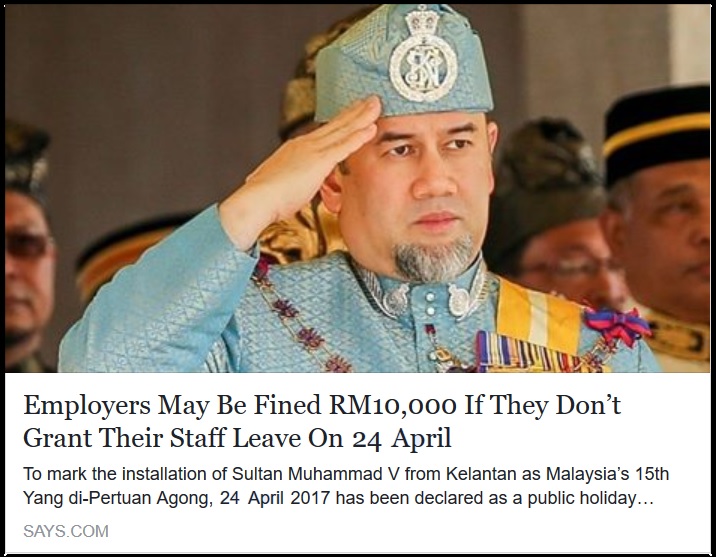
The news is like an oasis in the middle of the desert that is April, with no other holiday for the central region. Except maybe for Isra’ Mi’raj for Negeri Sembilan, but that’s just them. Anyway, as can be seen in the screengrab, there is a saman for being a slave driver on that particular day as it was declared as a public holiday by the Federal Government, which is one of three types of holidays we can get in Malaysia.
- Public holidays are listed down in the First Schedule of the Holidays Act 1951 (Act 369). The 11 days listed in the schedule is observed all throughout Malaysia, and include the National Day, both Hari Rayas, the Chinese New Year, Wesak Day, Deepavali and Christmas among them. Besides careers like manning the emergency rooms, money transfers or patrolling the borders, most other careers are required to take the day off on these days. Decided by the Federal gomen.
- Bank holidays are only observed by those working with… well… banks. There are two days of bank holidays in a year, and unless it falls on a weekend, it’s always on the 1st of January and July every year. On these days, financial business shuts down for a day and resumes the next day.
- Occasional holidays (or cuti peristiwa), on the other hand, are generally less inclusive when compared to public holidays. While a public holiday is observed throughout the nation (except maybe Sabah and Sarawak, as they have their own laws on the matter), occasional holidays isn’t really compulsory for jobs other than gomen offices. The scope varies, from affecting a few states to a particular district or school. Usually given by State gomens, although in some cases the Federal gomen has a hand in it.
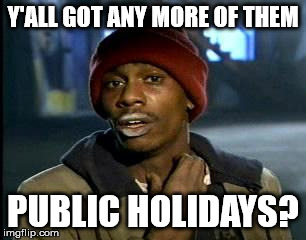
Besides these holidays, moar can be added as necessary according to Section 8 of the Holidays Act.
A Minister can declare any day as a public or bank holiday as an extra holiday or as a replacement for the days in the Schedule for the Peninsular and the Federal Territories or certain States (after consulting the States). These days are treated the same as the ones originally in the Schedule. – The tl;dr (and possibly innacurate) version of Section 8 of Act 369.
This section basically gives the Minister responsible the power to appoint any day he wants as a public holiday in the Peninsular (Sabah and Sarawak got slightly different rules and considerations for this), or in the case of State Holidays (like a Sultan’s birthday or Hari Hol), after discussing with the relevant State Authorities.
So how does the authorities decide when we get to cuti? Well…
1. When our sports heroes win big. Like, BIG.
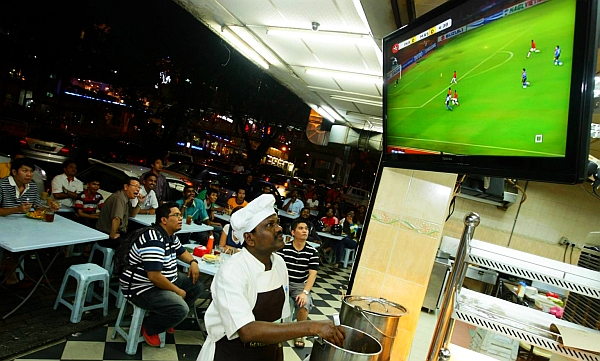
Sports is a huge component of Malaysian culture, particularly football and badminton. With fervent fans queuing up the night before to buy tickets to screaming at the players from a mamak stall, it’s no wonder that accomplishments in the sport is treated as a big deal. So big that sometimes, it warrants a holiday.
Most fans of the sport would remember us beating Indonesia at the finals of the AFF Suzuki Cup back in 2010, making it the first time we’d ever won at a prestigious south-east Asian football tournament. With the record-breaking win in place and the Prime Minister Najib Razak calling it as “the greatest night in Malaysian football“, all Malaysians, nationwide, were given one day of holiday to celebrate.
Other football wins that warrant holidays are mostly from tournaments within Malaysia, so most of the time only the winning state gets a day off. Take for example Selangor’s win in the 2015 Malaysia cup after ten years of not winning it. That win was celebrated by a public holiday the following Monday for the whole of Selangor only.
Another case would be when the Johor’s Southern Tigers’ win in the AFC Cup in 2015, where the win also marks the first time a South-east Asian team had won the tournament. That had been considered impressive enough to warrant a public holiday. However, much to the chagrin of JDT fans, their win in the FA Cup in 2016 does not qualify for a holiday.
The “epic win” prerequisite for a public holiday does seem to be true, as in the case of Rashid Sidek’s and Foo Kok Keong‘s victory in the 1992 Thomas Cup. They won a tournament at the world level, granting much rejoicing for the nation as well as a national public holiday. Therefore, it comes as a given that another win at that level would also grant a public holiday, too.
“I want a public holiday… that is why I will cheer the loudest!” said H.P. Gan, 26, in an interview with the Malay Mail Online during the Thomas Cup in 2014.
Sadly, we didn’t win the Thomas Cup in 2014, but hey. Although there was no public holiday, second place at that level is pretty impressive, too.
2. Sometimes, you get holidays from political stuff
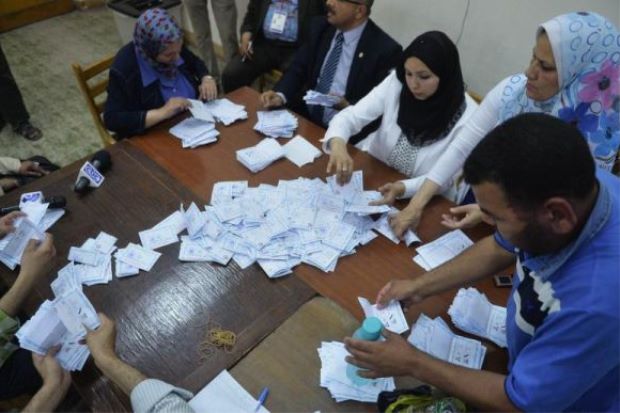
For anyone who has voted before, we fully expect the voting day to be declared as a public holiday, and for good reason. Nowadays, many of us work in a different state from where we are registered to vote, so if we were to travel from, say KL to Sabah for an election on a weekday, a 2-hour lunch pass won’t cut it. In fact, it is even required by law for employers to give their workers…
“…a reasonable period for voting, and no employer shall make any deduction from the pay or other remuneration of any such elector or impose upon or exact from him any penalty by reason of his absence during such period.” – Excerpt from Sec. 25, Election Offences Act 1954.
For nationwide general elections that happens far apart, it might seem sensible to give a day off to give the voters a chance to go back to their hometowns and vote. While a ‘reasonable period’ does not always mean a full day, there have been records of holidays given for by-elections, namely for two cases in 2015 for the Rompin and Permatang Pauh by-elections, for the states of Pahang and Penang, respectively.
While these decisions received some criticism, they doesn’t draw quite as much flak as the recent holiday given in Kelantan for the people of Kelantan to march out and support the RUU 355, or more commonly known as the Hudud Bill. The holiday, given on a Sunday (as Sunday is a working day in Kelantan), is to make it more convenient for supporters of the Bill to return to Kelantan after the gathering, which is held on a Saturday. This decision was met with much support by supporters of the Bill, while others… not so much.
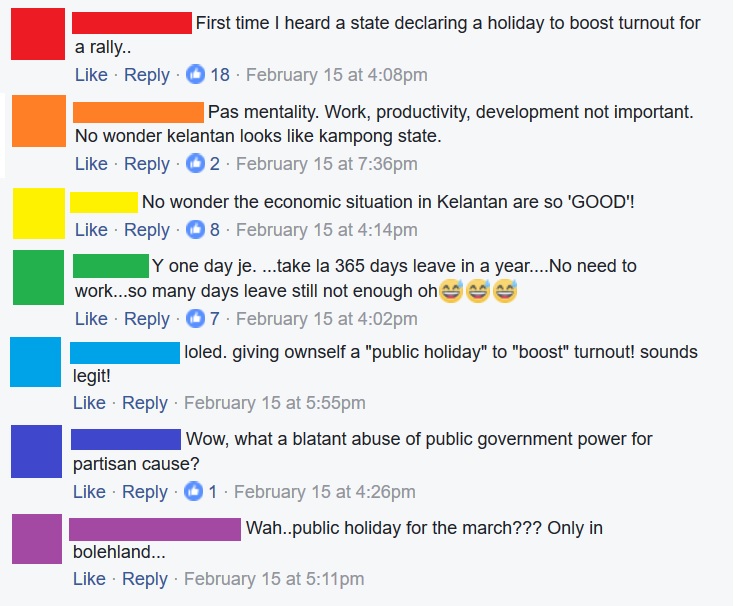
3. More religious/cultural events are now holidays!
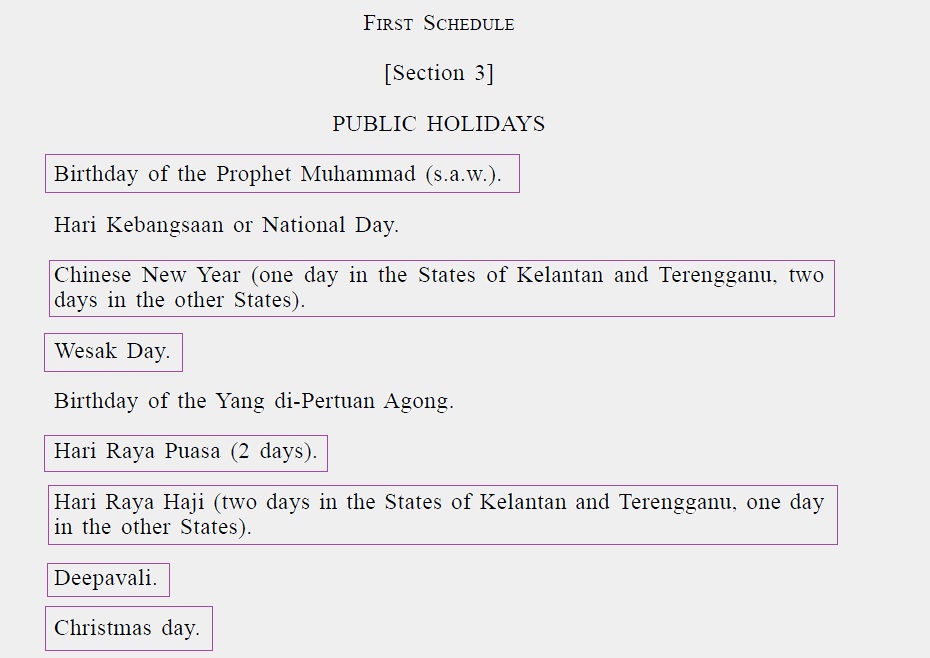
As can be seen in the First Schedule of the Holidays Act, there are only 11 days of public holidays. Being a multicultural country, of course we have more than that, but according to the inhabitants of each state, aside from the nine gazetted public holidays, some days are considered a holiday while others are not. For example, Good Friday is a holiday in Sabah and Sarawak but not in any of the Peninsular States.
Similarly, Thaipusam is not considered a holiday in the state of Kedah. However, since 2013 the state authorities have been making it an occasional holiday each year, meaning that civil servants and the general public get the day off. Being an occasional holiday as opposed to a public holiday, this means that the fate of private workers on that day depend on their employees.
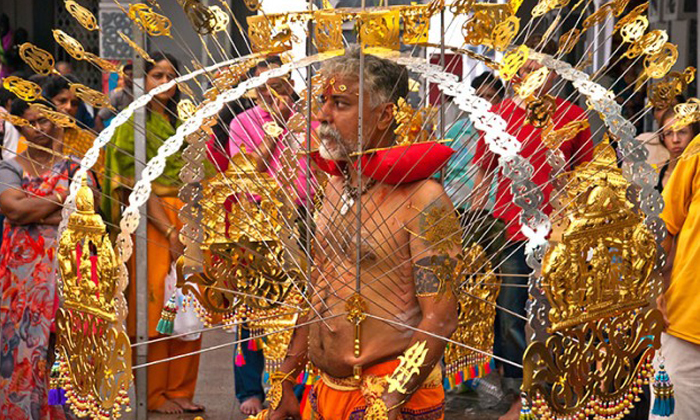
This is different from the establishment of the Nuzul Al-Quran day as a holiday in the Federal States of Putrajaya, Labuan and Kuala Lumpur in 2014. In the related documents (P.U. (B) 474 and 475/2013) it was declared that these days be added as a public holiday in the Federal States in addition to the ones already listed in the First Schedule, meaning that the day doesn’t have to be declared as a public holiday every year.
4. Students (and teachers) get holidays like no tomorrow

It has always been said that if you want a lot of holidays, you should consider being a teacher. While some teachers may disagree…
“Ehhh… You think being a teacher have a lot of holidays is it? Weekend some more need to paint the classroom… You think the student’s homeworks grade themselves is it? Exam season who makes the question papers? Who arrange the tables in the exam hall? Who?!” –Miza, primary school teacher, Kajang. (translated from Malay)
…it can’t be denied that just with the year-end holidays alone, students (if not the teachers and staff as well) win at life. There are more holidays they can get, of course. Most schools have a system where each year, they get up to four (4) days that they can declare as an occasional holiday (cuti peristiwa). These are particularly helpful when there are events that warrant a holiday, like a Qing Ming Festival or lengthening a particular short holiday like Deepavali.
However, they can also be used in other ways, like in the case of this school in Pengkalan Chepa, Kelantan where the students are asked to take an occasional holiday in fear of a pocong attack. For those of you who don’t know, a pocong is a Malay ghost wrapped in its burial shroud, but since its arms and legs are wrapped they have to resort to hopping or teleporting around.

Schools also get closed from time to time due to nature, like when it floods in the east coast earlier this year or right now in Sabah, at the time of the article. When schools are closed because of floods, it’s hard to qualify that as a holiday, what with lives and property are at stake and all. However, some consideration may be given when closure is due to the exceptionally bad haze or when a heat wave strikes, as it brings about the chagrin of working adults and university students alike.
5. Sometimes, we declare more holidays so we don’t have to apply for leave

This was exactly the case during last year’s raya, where Hari Raya Aidilfitri fell on the 6th of July, which is a Wednesday. This automatically makes Thursday a holiday as well, leaving Friday standing between us and a 5-day holiday. Luckily for some, the 8th of July was granted as a public holiday by the gomen should the first day of Raya fall on the 6th, which it did. Apparently it was a pretty big deal then, because there was some drama from the National Union for Bank Employees (NUBE) that year asking for it to be a holiday for bank employees too. They even made videos to convince the YB responsible some more.
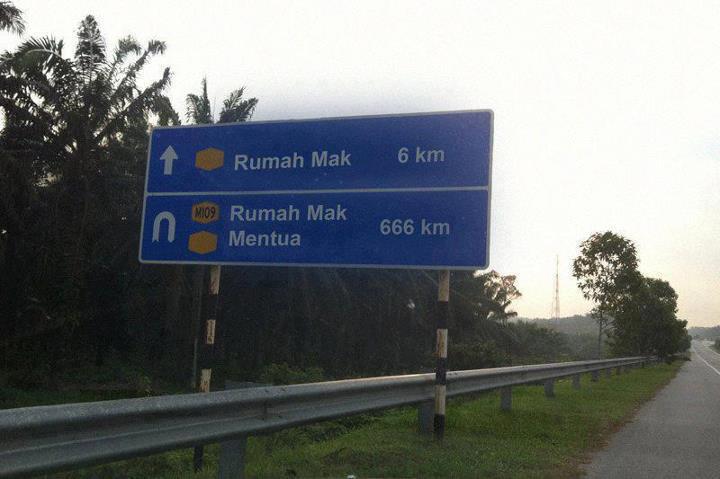
Another instance is in Kelantan, during the Hari Raya Aidiladha last year. As had been stated earlier, for Kelantan and Terengganu, that warrants a 2-day holiday, which fell on a Monday and Tuesday. However, the day before Aidiladha is known as the Hari Wukuf, or the climax of the Hajj. As Sunday is a working day for Kelantan, it was decided that Sunday would be a public holiday, so that the Muslims in the state may perform a fast and prepare for the celebration, according to Kelantan MB Datuk Ahmad Yakob. This effectively connects the Aidiladha holidays to the weekend, giving Kelantan a 5-day holiday.
Ehh… So easy to get a holiday nowadays!

By the instances mentioned in the article and the related laws, it appears that the establishment of a public or occasional holiday is not really that complicated, and holidays can legally be declared as long as the authorities agree to it. While public holidays are something to look forward to, sudden, unprecedented public holidays (and lots of them) may wreak havoc on some businesses. Even us at CILISOS had to push forwards some appointments in the past due to surprise holidays.
Not to say that the upcoming public holiday is a bad thing, as it was long known that this big of an event will warrant a public holiday. However, in cases such as the sudden RUU355 gathering holiday, there is the problem of gomen offices and services being unavailable for the day. This is great for the gomen workers, but as a lawyer for the Orang Asli had put it, incarcerated people’s liberties may be at stake due to the postponement of hearings. These incarcerated people, should there be a sudden occasional holiday, will have to spend another day in detention.
“Declaring the day off when we already have one of the highest number of public holidays in the world is counter-productive. It affects productivity and the economy,” – Centre for a Better Tomorrow (Cenbet) co-President Gan Ping Sieu, for Astro Awani.
For most of us who plan our years around public holidays, they are something to look forward to, something that breaks the routine once in a while. But as some occasional holidays have showed us, sometimes it’s a case of having too much of a good thing. Maybe we’ve got enough holidays as it is.
- 1.3KShares
- Facebook1.1K
- Twitter16
- LinkedIn16
- Email43
- WhatsApp59



